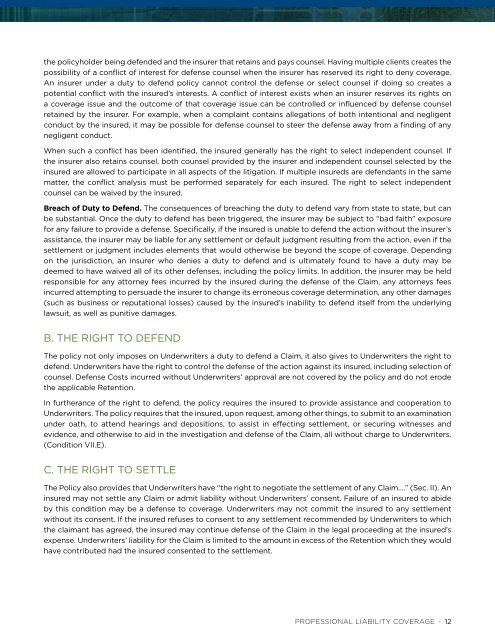Create successful ePaper yourself
Turn your PDF publications into a flip-book with our unique Google optimized e-Paper software.
the policyholder being defended and the insurer that retains and pays counsel. Having multiple clients creates the<br />
possibility of a conflict of interest for defense counsel when the insurer has reserved its right to deny coverage.<br />
An insurer under a duty to defend policy cannot control the defense or select counsel if doing so creates a<br />
potential conflict with the insured’s interests. A conflict of interest exists when an insurer reserves its rights on<br />
a coverage issue and the outcome of that coverage issue can be controlled or influenced by defense counsel<br />
retained by the insurer. For example, when a complaint contains allegations of both intentional and negligent<br />
conduct by the insured, it may be possible for defense counsel to steer the defense away from a finding of any<br />
negligent conduct.<br />
When such a conflict has been identified, the insured generally has the right to select independent counsel. If<br />
the insurer also retains counsel, both counsel provided by the insurer and independent counsel selected by the<br />
insured are allowed to participate in all aspects of the litigation. If multiple insureds are defendants in the same<br />
matter, the conflict analysis must be performed separately for each insured. The right to select independent<br />
counsel can be waived by the insured.<br />
Breach of Duty to Defend. The consequences of breaching the duty to defend vary from state to state, but can<br />
be substantial. Once the duty to defend has been triggered, the insurer may be subject to “bad faith” exposure<br />
for any failure to provide a defense. Specifically, if the insured is unable to defend the action without the insurer’s<br />
assistance, the insurer may be liable for any settlement or default judgment resulting from the action, even if the<br />
settlement or judgment includes elements that would otherwise be beyond the scope of coverage. Depending<br />
on the jurisdiction, an insurer who denies a duty to defend and is ultimately found to have a duty may be<br />
deemed to have waived all of its other defenses, including the policy limits. In addition, the insurer may be held<br />
responsible for any attorney fees incurred by the insured during the defense of the Claim, any attorneys fees<br />
incurred attempting to persuade the insurer to change its erroneous coverage determination, any other damages<br />
(such as business or reputational losses) caused by the insured’s inability to defend itself from the underlying<br />
lawsuit, as well as punitive damages.<br />
B. THE RIGHT TO DEFEND<br />
The policy not only imposes on Underwriters a duty to defend a Claim, it also gives to Underwriters the right to<br />
defend. Underwriters have the right to control the defense of the action against its insured, including selection of<br />
counsel. Defense Costs incurred without Underwriters’ approval are not covered by the policy and do not erode<br />
the applicable Retention.<br />
In furtherance of the right to defend, the policy requires the insured to provide assistance and cooperation to<br />
Underwriters. The policy requires that the insured, upon request, among other things, to submit to an examination<br />
under oath, to attend hearings and depositions, to assist in effecting settlement, or securing witnesses and<br />
evidence, and otherwise to aid in the investigation and defense of the Claim, all without charge to Underwriters.<br />
(Condition VII.E).<br />
C. THE RIGHT TO SETTLE<br />
The Policy also provides that Underwriters have “the right to negotiate the settlement of any Claim….” (Sec. II). An<br />
insured may not settle any Claim or admit liability without Underwriters’ consent. Failure of an insured to abide<br />
by this condition may be a defense to coverage. Underwriters may not commit the insured to any settlement<br />
without its consent. If the insured refuses to consent to any settlement recommended by Underwriters to which<br />
the claimant has agreed, the insured may continue defense of the Claim in the legal proceeding at the insured’s<br />
expense. Underwriters’ liability for the Claim is limited to the amount in excess of the Retention which they would<br />
have contributed had the insured consented to the settlement.<br />
PROFESSIONAL LIABILITY COVERAGE · 12



